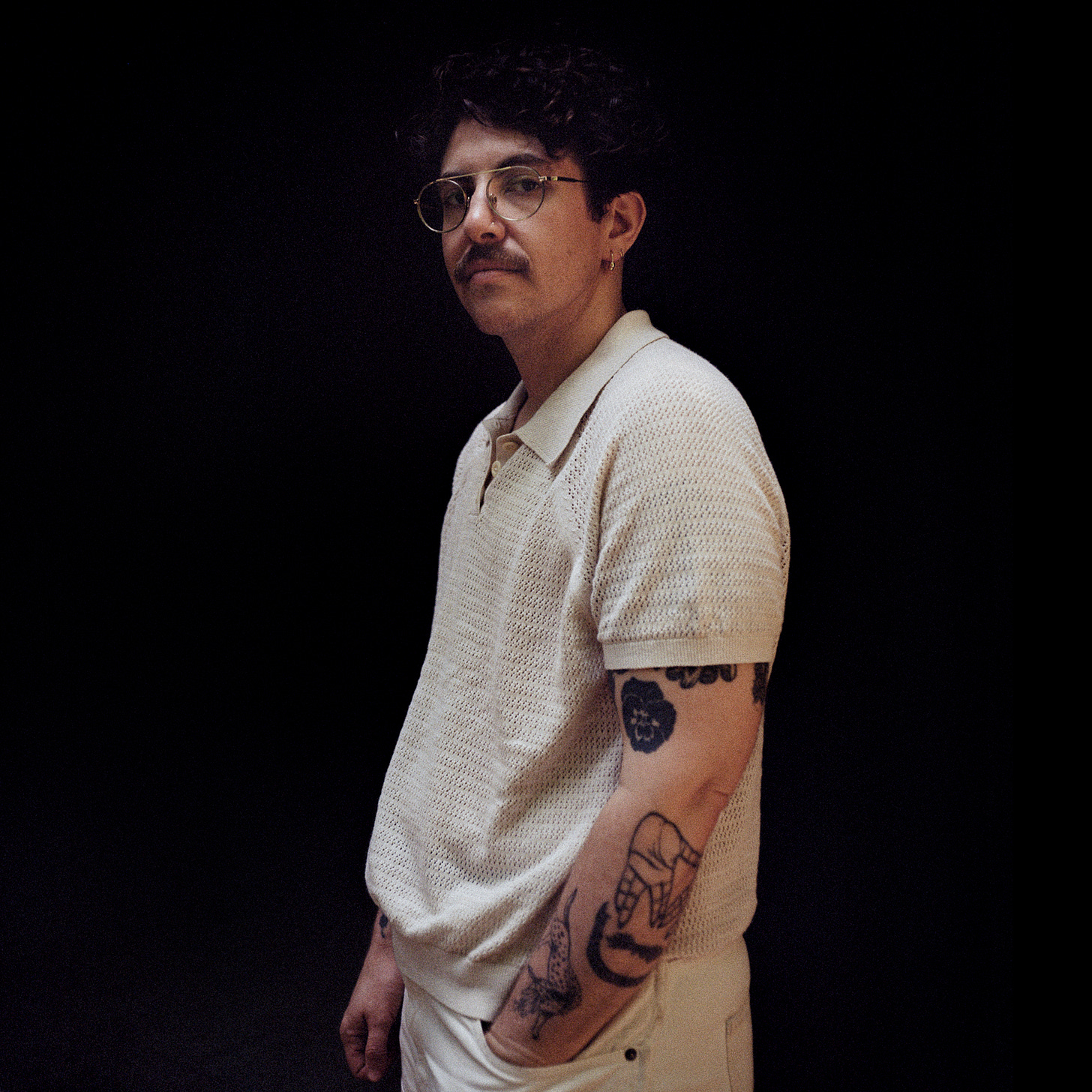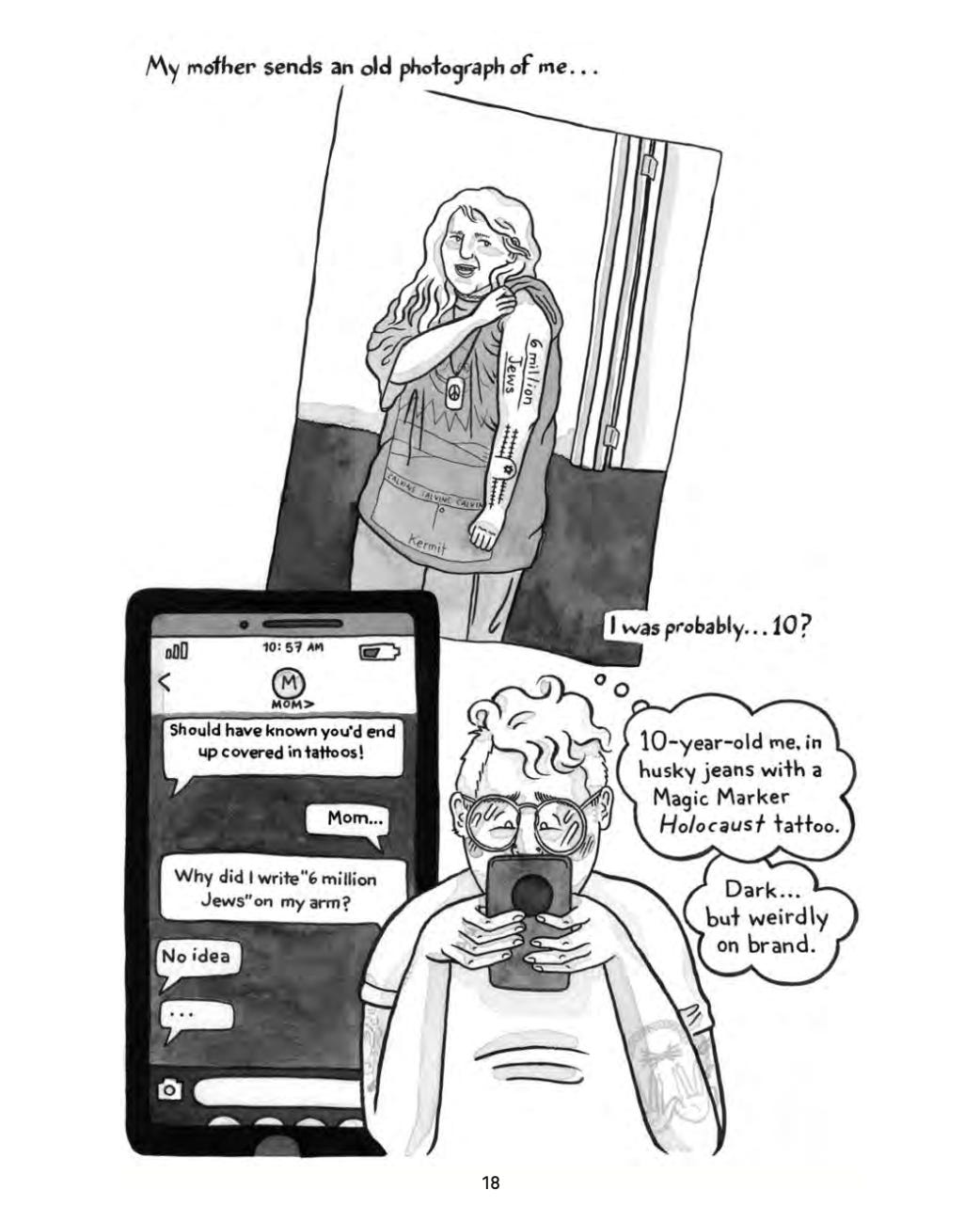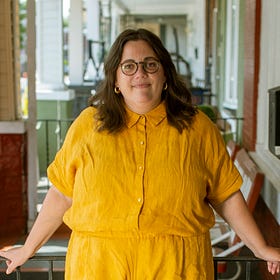Hello! I’m back with another queer author interview, this time with Solomon J Brager about their new graphic novel, Heavyweight. My goal for this series is to highlight next-level fiction and nonfiction and resolve the “I want to read something but I don’t know what“ conundrum that I’m constantly hearing from friends and T.V. Dinner readers alike. So this is me, telling you what to read. I hope you like it :) xoxo, Maddy
As a Jewish kid growing up in the 1990s, Solomon J Brager developed a deep fascination with the Holocaust and family stories about their great-grandparents’ harrowing escape from Nazi-occupied Europe. They were especially interested in their great grandfather, Erich Levi, a champion boxer who allegedly fought Joseph Goebbels and won. In their new graphic memoir, Heavyweight, Sol places these family legends in the larger context of colonialism, Zionism, their family’s preoccupation with athleticism and physical fitness, and more.
In the vein of Alison Bechdel’s Are You My Mother?, Heavyweight is a memoir about the difficulties and pains of writing a memoir. Sol wrestles with their desire to tell a coherent story, which requires filling in gaps in the historical record, inventing dialogue, and other acts of imagination—and their training as a historian, which generally counsels against making shit up.
Solomon and I spoke via GoogleDoc about Heavyweight, the allure of genealogy, haunting as a research methodology, and what it’s like to write a book about your own family. I’m a huge fan of Sol and their work, and I’m excited to share this interview with you.
Maddy: In Heavyweight, you turn to your great-grandparents’ escape from Nazi Germany in order to understand yourself and the current state of your family. In recent years, concepts like intergenerational trauma and epigenetics have entered the mainstream and millions of people are paying genetic testing companies like 23andMe to learn about their ancestors. Do you think these are trends that reflect a cultural shift by younger generations or have people always been interested in their own ancestors and origin stories?
Sol: I do think that people have always been interested in their own origin stories, but of course one of the effects of globalization and the originating violences of modernity– colonization, chattel slavery, and other waves of displacement and disjunction from our origin stories– people don’t have the kind of access to these stories that we might have had if we were living in the same places as our ancestors, with unbroken access to their histories. It makes a lot of sense that knowing where we come from should help us understand ourselves, and it does give us a narrative basis from which to work. For me this is operative in a couple of ways– for example, knowing that the part of my family I write about in Heavyweight were Ashkenazi Jews who lived in Germany for hundreds of years until they were expelled or murdered under the Nazi regime helps me think about my relationship to European colonial history, and, because this is something I’m very politically invested in, relationship to false claims to indigeneity in Palestine and the Jewish settler colonial project there. Studying history has shaped a lot of my politics. In terms of intergenerational trauma and epigenetics specifically, a lot of the research on this is really questionable–if your grandparents, parents etc. are able to deal with their trauma, you won’t inherit it on the embodied or behavioral level. The idea that trauma morphs people on a physiological level that is then inheritable is largely junk science. With the 23andMe and other DNA testing, besides putting your bio data into the hands of cops and corporations, I frankly think a lot of it functions on a similar level as like, astrology, where this information doesn’t actually shape your personality, or the things you like, it’s not why you are the way you are. The data can’t fill in for what so many people have actually had ripped away, which is sustained intergenerational memory, or an indigenous relationship to place. But especially for people whose families experienced violent rupture on the level of total destruction of descendancy, who have no idea where they came from, who aren’t in the archives, it makes sense that there’s this draw to a kind of detective work, where the only existing archival data might be genetic. I both dislike these biometric projects and see the ways in which they are dangerous, and understand their draw.
M: I was really amazed by the depth and breadth of your family archive. It’s pretty extraordinary to have photographs of your great-great grandparents and to be able to watch film footage of your great-grandparents’ wedding, as well as home movies of your grandfather as a child in the 1930s. For comparison there is like, one video of me as a child and I was born in the 1990s. For those who haven’t read the book, can you talk about a discovery in your research that meant a lot or was especially powerful?
Sol: Totally– even without the circumstances of having to escape from internment with none of their belongings, even if there had been no disjuncture, having this rich family archive is an incredible privilege. The other side of my family has been in the U.S. since the 1910s and I have a handful of photographs that I found rotting in a paper bag in my Bubbie’s basement. My German family had a lot of class privilege– when they were refugees in Belgium in the 1930s, my Oma and Opa still were able to have a black tie wedding at the fanciest synagogue in Antwerp, and to have film footage of that wedding. The wedding was written up in the local paper, with a photograph of them. And I think they had personalities that were inclined towards documentation, they don’t just have formal family portraits, I have tons of photos of them being really silly, a startling amount of photos of family dogs, lots of group photos at parties. But then there’s the additional layer of this period of flight during the Holocaust– both sides of the family had their homes stolen, one was eventually destroyed in an allied bombing, they both escaped with few belongings, from Germany and then again from Belgium, at every stage of escape the number of things they were able to bring with them got smaller. Those photographs, the home movies, all of that got left in their apartment in Antwerp. The reason we have it is that a neighbor told the Nazis occupying the apartment that the Levis (my great-grandparents) owed them money, and he went into the apartment and grabbed a bunch of photo albums and film reels and maybe some jewelry, and held onto it until 1949 when the family came back to Europe. He had no way of knowing they would survive or ever come back to Antwerp, but he did it anyway. It’s incredible to have that archive both for its memorial capacity and also because the images contain a lot of informational clues that I was able to follow up on or cross reference with state archives to piece together parts of the story.
Even within this, though, I didn’t know the full wealth of what I had access to. For years I would just add these keywords to searches, like I would be at the Leo Baeck Institute and just throw, “Erich Levi, Essen, boxer” into my search and find nothing. I had seen a ton of these family photos but mostly as reproduced scans. It wasn’t until I went to my grandparents house in North Carolina and went, “hey, show me everything you’ve got” that they produced this big bin of albums and tapes. One of the first things I pulled out was a scrapbook full of photos and posters and clippings from my great-grandfather Erich Levi’s boxing career. Years earlier I had written a whole academic paper about fictioning as a method, about this heavyweight boxer that was my great-grandfather, that only existed as a myth because he wasn’t in any archive. And there was the whole archive, in an attic in North Carolina.
M: I loved the interviews with your grandfather and other living relatives throughout Heavyweight. I got the sense that your grandfather was a pretty terse and avoidant interviewee, while your aunts and sisters were more enthusiastic. Do you have any advice for writers who want to write family histories or memoirs, but aren’t sure how to approach their relatives about it? I’m thinking of the classic advice for nonfiction writers that’s like, “Don’t write anything you wouldn’t say to someone’s face.”
Sol: That’s so funny, because most of the things I wrote about my relatives in this book I wouldn’t really want to say to their faces, even though I gave them the book afterward. Everyone in my family really wanted me to write a book about this, but not this book–they wanted something more like “Ilse and family’s heroic escape from Nazi Germany into the safe arms of America, a very good place.” I had an interviewer ask if my parents were upset because they don’t look very good in the book and I was like, are you kidding? They bought a case of them and have been giving them to everyone they can think of. I was worried my grandfather would be kind of upset, but mostly he was like, very interesting, what if you wrote a novel next, and then sent me an article about how to get books reviewed by the Wall Street Journal.
In terms of his reticence, I think if I had written the book more about my Oma, his mother, it would have been easier for him to talk about when I was interviewing him– he really loved her and was proud of her, and had a way more complicated relationship with his father, who died when he was a teenager. But I also knew my Oma, since she died in my twenties, and I wanted to focus on these people I had never gotten to meet, especially Erich Levi. Not only was I asking my grandfather to expose his father, I was also asking him a ton of questions that he legitimately just didn’t know the answer to. For this project I started with the stories my Oma recorded, the narrative of her life that she made accessible, and then dug past that into the things no one wanted to talk about. If she was still alive that project might look different, I would have to contend with asking her to talk about things she refused to look at– mostly the incredible loss she had suffered during the Holocaust. My grandfather was a child when all of this was happening and he really doesn’t remember anything–whether that's an impact of trauma or not–versus refusing to discuss it. I think a question I have for people who want to write about their families would be–do you want to write the stories everyone tells in your family, or do you want to write the stories no one tells, because they’re lost or buried, or hard to talk about for other reasons. And why are you writing the book– for example, do you want it to bring you closer to your family? Do you want to use your family story to get at a larger narrative or a historical moment? Talking to your family is going to be part of your research plan, so what’s your strategy?
M: That’s such a strange question for an interviewer to ask. For what it’s worth, I don’t think anyone comes off poorly in the book.
The concept of “haunting” comes up a few times in Heavyweight, and I was wondering if you could explain it to me. I’d never heard of it before!!
Sol: I think people have really different expectations for how others should act?
Okay, so, haunting. We’ve already established that I’m a huge nerd, so shockingly, my understanding of this on a societal level comes from sociology, specifically from the work of Avery Gordon, and the ways her work on haunting has been taken up by others including Eve Tuck and C. Ree. For Gordon, haunting is a way of describing how the shape of modern social life is molded around absence, whether that’s the ghostly presence of those marked for social death, i.e. addicts, the unhoused, the people we’re trained to let our eyes slide over, or those who are removed from social life, like the incarcerated, the deported, the disappeared. In research haunting is a way of thinking about who doesn’t make it into the official archive and how the story we piece together in the archive reveals an empty outline where the shape of the ghost fits– Saidiya Hartman introduces critical fabulation as a way of fictioning these archival ghosts back into a rich life, a historical method I also reference in Heavyweight. Or on the level of evidence, sometimes you want something, like a photograph, to offer clear, definitive proof of something, and it just doesn’t. The thing you’re looking for is just out of the frame, or it’s there but can’t be seen. Tuck and Ree, in “A Glossary of Haunting,” describe haunting in the context of the United States as a settler society, as unresolved and unresolvable, unceasing, a refusal and a confrontation: “the relentless remembering and reminding that will not be appeased by settler society’s assurances of innocence and reconciliation.” On an individual level I think haunting can be a way of thinking about trauma, about a sort of pre-knowledge or deferred knowledge, where you don’t know something but its impact is there, so you’re getting the impact without knowing the cause. That’s basically what a haunting is. Inasmuch as most ghost stories are just stories about trauma, they really follow this model– you need to be able to name the ghost and figure out their unfinished business to put them to rest. And if the business is, for example, the ongoing genocide of settler colonial society, then there’s no putting the ghosts to rest, in fact we are constantly producing more ghosts, and we stay haunted.
M: I was drawn to the moments in Heavyweight where you visualize your research or attempts to make sense of the past i.e. when you're fighting your great-grandfather's ghost. What do you think comics can offer that straight-up writing can't?
Sol: The most straight-forward thing that comics offer is that there are pictures AND words, so you get to work with those two things together, which can produce a different impact than only text. In this sense I think comics have more in common with film than with literature. There are things in this comic that probably could have happened in text, like digressing from a historical argument to have an imaginative interlude, or weaving creative writing as a method into your work. Some of the best academic work does this, and I like to think, if I had written an academic book, that I could have done something like that. But I think what you can get away with really depends on the tenure requirements of your field. And I didn’t have to write an academic book, because I didn’t get a tenure-track job. I’m off the hook. I like to draw comics, and I want to be able to be goofy, or inappropriate, or to move sort of jarringly between showing you archival texts and making jokes and talking to ghosts. And I want to do it in comics. More than anything, I want to make comics!
M: Heavyweight works so well as a comic, it’s hard for me to imagine it as an academic book. Thanks so much for talking, Sol!
Sol: Thanks Maddy, it’s been delightful!
Heavyweight is out now! Find a copy at your local library, bookstore, or comic shop. You can find more of Sol’s comics on their website and Patreon. 💪
Housemates with Emma Copley Eisenberg 🏠
Hello! I’m back with another queer author interview, this time with author Emma Copley Eisenberg. My goal for this series is to highlight gripping, next-level fiction and nonfiction and resolve the “I want to read something but I don’t know what“ conundrum that I’m constantly hearing from friends and









